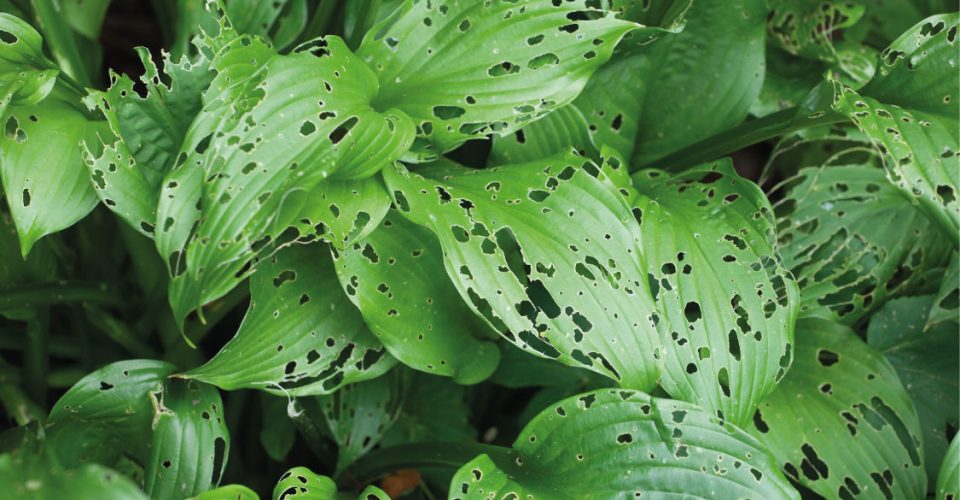How to Get Rid of Garden Pests
Eliminating slug, snail and aphid damage from plants and vegetables is easy if you follow the simple steps outlined below. Pest control can be an enjoyable part of the routine if you are hungry to learn new skills and be active in the sunshine and, in terrible weather, the potting shed. Get the children or grandchildren involved, be creative and overall have fun. Before you know it, your garden will be teeming with flora and fauna, and exactly the right kind of bug life to make for healthy plants and vegetables.
Here is how to get rid of garden pests, one step at a time.

Attract Beneficial Predatory Insects
A great way to get rid of pest is by attracting beneficial predatory insects into your garden. To do this you’ll want to Plant flowers from the cosmos genus, as these will encourage ladybirds and hoverflies. Alternatively Other plants such as buckwheat, dill, fennel, lavender and thyme attract parasitoid wasps who will eat various kinds of pest larvae.
Build Healthy Soil
Building healthy soil is another sure fire way to keep pests at bay. You’ll want to begin by Limiting the soil disturbance; turning the soil too often will cause soil compaction and erosion and will kill the earthworms that aerate it and keep it healthy.
Next start a compost bin and layer an inch of thoroughly decomposed compost onto the garden each spring to boost soil nutrients. Follow this by rotate crops and plants as this will confuse pests that have developed a home in (and taste for) your beds
If leaving fallow, plant buckwheat, marigolds, peas or ryegrass to maintain soil structure and suppress weeds
Monitor the Garden
Now you’ve got the basics set you’ll want to start monitoring the garden. You don’t to patrol the perimeter just make regular to checks to assess the progress. Start by checking the underside of leaves as pests will lay eggs and sacks in these places; if found, remove them before the next generation of pests can hatch.
You’ll also be able to assess what type of pests are damaging your plants by consulting a gardening handbook. Do this if you find:
- Chewed leaves
- Deformed leaves
- Discoloured leaves
- Leaf galls (growths)
- Skeletonised leaves
- Slime trails and chewing
Install Bug Hotels
A bug hotel encourages beneficial insects that help with pest control, pollination and improve the local ecosystem and actively attracts predatory insects. To do this simply create a pile of dead wood and rocks in the garden, Leave a patch of longer grass around the wood and do not remove nettles or simply buy a bug hotel.
Install a Pond
Installing a pond in your garden will attract all manor of life. You’ll get frogs and toads who happen to be hungry for slugs and insects as well as birds looking to bathe and drink; they are also great at eating up pests
Mechanical Pest Solutions
If you’ve exhausted the natural solutions you can also consider mechanical pest solutions. You can utilise covers, nets, small fences and paper collars as these can be effective against any pests; use transparent plastic or fine weave nets. You can also use traps bought from the garden centre or made at home as these are simple and effective.
If you need to bring out the big guns you’ll be looking at something like insect vacuums. They are an expensive option, but they do enable you to precisely target insects. Alternatively you can use a pressure washer to jet insects away from plants, but this must be carefully applied so as not to damage foliage.
Organic Chemical Cures
If you looking for a more organic approach things like homemade garlic plant spray is effective against all insect pests as long as you spray it thoroughly on all plants; puree three garlic bulbs, pour ½ pint of boiling water over the garlic and leave overnight; strain, put in a spray bottle and spray plants every two days.
Another all-insect repelling option is hot pepper spray; take 1 pint of water, a dash of castile soap, 1 tablespoon of cayenne pepper and put it in a spray bottle; it is ready to use immediately but test on a single leaf first; dilute if necessary.
Alternatively there’s the The classic beer trap; pour an inch of beer into the bottom of a small container, or even a saucer; leave many traps on the vegetable patch perimeter; slugs and snails will be attracted to it but will become too merry to escape.
Once you know how to get rid of garden pests, it’s a simple case of repeating the process every year. With time, you will find that you are more and more prepared each season, and can watch your garden flourish. Expect fantastic results with your flowers and plants when you get rid of your garden pests, and enjoy bumper crops of healthy veggies to boot

